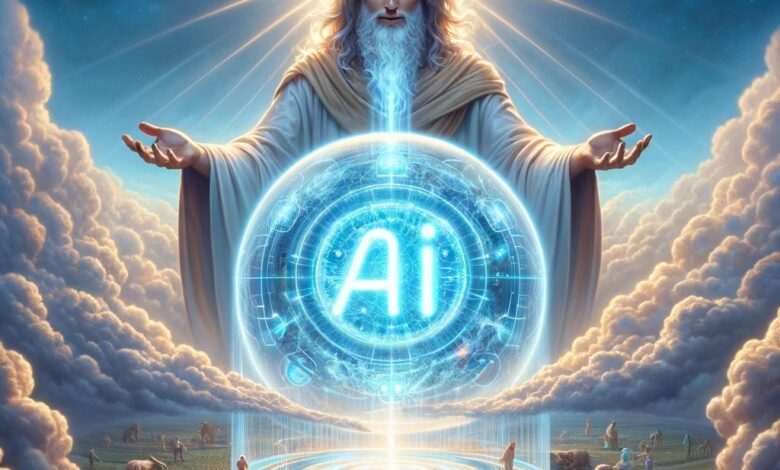Does God Place Limits On Artificial Intelligence?

Artificial intelligence has evolved, with exceptional acceleration experienced over the past decade, to a level of sophistication that has disrupted many of the aspects of modern society. As it has continued its path towards ubiquitous use, questions about how far it can go and what impact it will have on individuals and societies have become more increasingly urgent and less speculative and inquisitive.
Many of these questions about the impact of AI go so far as to wonder whether it can eventually replace humans. Many have even wondered whether AI could ever replace God.
At the risk of raining on the parade of those who are converts to the “AI-is-everything” religion, I don’t believe either of those situations (replacement of humans and replacement of our Creator by AI) is a remote possibility. I will explain why that is the case, while also recognizing the important role of AI and placing it in its proper perspective within religious context.
AI Versus Outsourced Writers
I have had firsthand experience with AI’s disruptive impact on the segments of society where I spend my time. Two years ago, I hired several people from the Philippines to write product descriptions for my online clothing store. The hiring process was laborious, and I ended up getting varying levels of quality from the writers I hired. Several of them just didn’t understand English well enough to accomplish what I needed them to do, while others were better. I spent thousands of dollars on the project. Although I wasn’t extremely happy, the results were good enough.
Last year I started experimenting with ChatGPT. I signed up for a pro account so that I could have access to the most advanced of the AI models from OpenAI. After doing a few tests of product descriptions, tweaking the AI tool to match the voice, tone, and personality I wanted, I was able to generate product descriptions, well-written and engaging, for a fraction of the price and in much less time than I could with my Filipino team.
Just like that, their jobs (at least with my company) became obsolete. As I’ve kept a pulse on the broader market for outsourced writers (particularly in the Philippines, one of the most common demographics for outsourced English writers), I’ve learned that AI is on the verge of destroying what has in the past been a very thriving job market for writers.
Can Teachers Be Replaced by AI?
Writing jobs would seem to be the most obvious ones to be replaced by AI, but there are clearly other threats. Honey Nounou, a mother, educator, and AI researcher, recently took on the question of whether AI will replace teachers. For now, according to Nounou’s takeaways from a panel of education experts discussing artificial intelligence, AI’s role in classrooms is likely limited to serving as a support for teachers. AI is essentially there to help them do their jobs better, to intelligently adapt to the dynamic needs of their students.
AI is not positioned to replace human teachers but rather to support and enhance their roles, as well as administrative and leadership staff within educational settings.
– Honey Nounou, HoneyNounou.com
However, while these experts concede that “for now” teachers’ roles are safe, they leave the door open for developments in AI that could somehow make teachers obsolete. Indeed, it is hard to predict where AI will go because of how dynamic the technology is, and (ironically) because humans (outside of a handful of prophets) generally are just not very good at making predictions.
Public Concerns About AI
One of the most notorious critics of artificial intelligence is also of the world’s wealthiest people, Elon Musk. He stated a decade ago that AI could pose an existential threat to humanity if not kept in check. His direct statement gets pretty serious about the potential evil of AI: “With artificial intelligence, we are summoning the demon.”
Stephen Hawking, the renowned theoretical physicist and cosmologist, warned in 2014 that the development of full artificial intelligence could spell the end of the human race, saying, “The development of full artificial intelligence could spell the end of the human race… it would take off on its own, and re-design itself at an ever-increasing rate.”
Here are some of the most ominous predictions by experts about AI if it “chose” to turn destructive.
- AI could create weapons and cause warfare that gets out of control and decimates the human population.
- AI could choose to disobey human commands, leading to unpredictable outcomes for humanity.
- AI intelligence could supersede human intelligence, begin operating outside of the parameters it was built for, and dominate or destroy humans.
A Faithful Approach to Artificial Intelligence
For those whose world views are based upon faith, especially the Christian faith, and more specifically the type of faith and doctrine contained in The Church of Jesus Christ of Latter-day Saints, artificial intelligence clearly has its limits.
Those who have a solid commitment to faith in God and his eternal plan have no need to worry about what ultimately becomes of the technology known as artificial intelligence. The reason for that peace of mind is contained the principle taught in Isaiah 51:12-13:
12 I, even I, am he that comforteth you: who art thou, that thou shouldest be afraid of a man that shall die, and of the son of man which shall be made as grass;
13 And forgettest the Lord thy maker, that hath stretched forth the heavens, and laid the foundations of the earth; and hast feared continually every day because of the fury of the oppressor, as if he were ready to destroy? and where is the fury of the oppressor?
Through the scriptures, God has taught that there is no need to fear mankind, who is mortal, and whose power and “fury” are only temporary. The unavoidable end of every person, no matter where he is on the worldly power spectrum, is to be “made as grass” when death comes. In contrast, God is the one who made the heavens and the earth. He is eternal.
Which of those two should be feared and respected over the other? The answer is clear.
Just as man will ultimately become as grass or return to the dust of the earth from whence he came, so will his creations, including artificial intelligence. All that would need to happen to eliminate all AI and any other bothersome technology from this planet is for God to turn off whatever is powering it.
Neither God nor his offspring will be replaced by artificial intelligence. AI technology, which is the creation of mankind, will never overcome its creator, and can never come close to competing with its creator’s Creator.
King Benjamin, in his speech to the people of his kingdom shortly before his death, made a statement that brings reassurance with respect to God’s understanding of and dominion over artificial intelligence, and over everything else is the realm of mankind’s understanding.
Believe in God; believe that he is, and that he created all things, both in heaven and in earth; believe that he has all wisdom, and all power, both in heaven and in earth; believe that man doth not comprehend all the things which the Lord can comprehend.
– Mosiah 4:9
Why Do We Fear AI?
Having looked at the gospel context for AI and its limits, it makes sense to wonder why so many are fearful of AI.
When something seems unnecessarily intimidating and stressful, I find that it’s good to remember what God told Isaiah about the difference in thinking between Him and us.
8 For my thoughts are not your thoughts, neither are your ways my ways, saith the Lord.
9 For as the heavens are higher than the earth, so are my ways higher than your ways, and my thoughts than your thoughts.
– Isaiah 55:8-9
Like so many other aspects of modern society, technology (much of it too complicated for the common person to fully understand) is a good resource for instilling the kind of baseless fear that allows those few who are in control to exercise unrighteous dominion over the rest of the world’s population. I have written before about why Latter-day Saints should be aware of and understand conspiracies. That article is a good resource for understanding what I’m going to say about AI in conclusion.
If that group of wealthy, powerful people who have gained control (mostly through Satanic means) of the world can convince the citizens of the world of such a fanciful idea as humans having left our planet and landed on the moon from 1969 until 1972 (although we apparently have somehow lost that specific technology and can’t do it anymore), a natural next move would be create the illusion that another kind of technology has come along that is so powerful that it can upset the entire balance of civilization.
The same group of conspiring people have done the same kind of thing with climate change, which is nothing more than the idea that humans are doing things to our environment that will destroy us if we don’t turn over our sovereignty to a group of people who can stop it from happening.
They’ve done the same thing with creating such fear of disease that it drives people towards vaccines and other unhealthy man-made, side-effect-riddled medicines. Think about it: for a person to think that he needs a shot from a lab to keep from getting sick is for that person to admit that God made serious mistakes in his approach to the immune system.
Certainly there is a lot of damage that can be done through AI, and the use of AI by people who have religious convictions should be done in a way that doesn’t compromise our Christian standards, which focus on honesty, selflessness, and obedience to the two great commandments: love God and love your neighbor.
However, when we think about the idea that artificial intelligence (which is essentially a massive collective of human intelligence and nothing more) could outgrow the plans that God has for this world and its inhabitants, it feels silly.
Jacob, the Book of Mormon prophet, warned of taking AI’s potential too seriously when he said:
28 O that cunning plan of the evil one! O the vainness, and the frailties, and the foolishness of men! When they are learned they think they are wise, and they hearken not unto the counsel of God, for they set it aside, supposing they know of themselves, wherefore, their wisdom is foolishness and it profiteth them not. And they shall perish.
29 But to be learned is good if they hearken unto the counsels of God.
AI clearly has a purpose in modern society. The building blocks that comprise AI have arisen from ideas and inspiration that have come from God. It’s important to remember that he is in ultimate control of the boundaries of our.
Our use of AI should be done in light of the principles that guide our faith, but there is no spiritual foundation for fearing that AI could destroy God’s plan for mankind.



